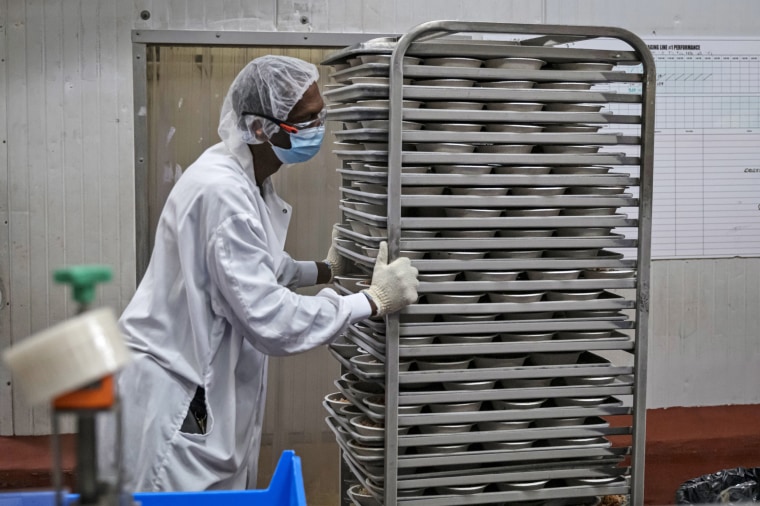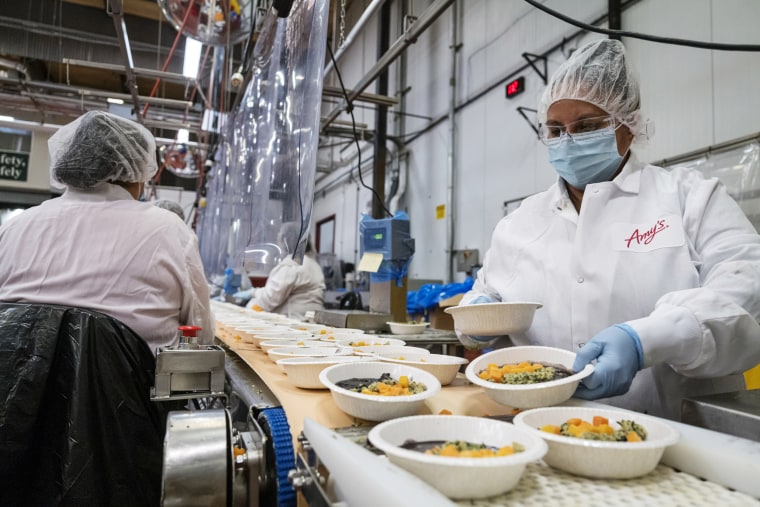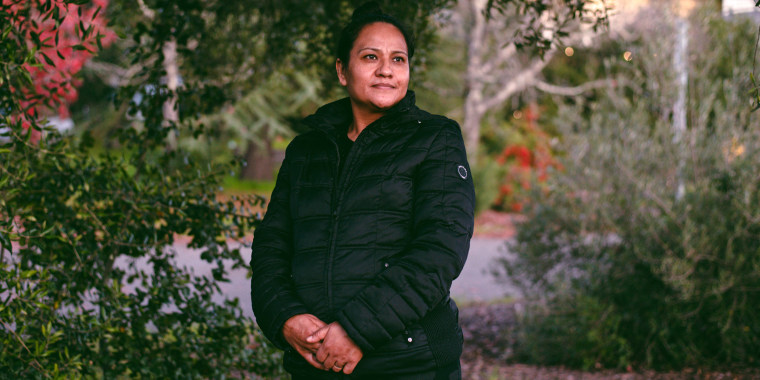A factory worker at Amy’s Kitchen who previously spoke out about working conditions has filed a formal complaint with the California Division of Occupational Safety and Health on behalf of all workers at the company’s Santa Rosa plant.
The Santa Rosa plant was the subject of an NBC News report about what workers described as an unforgiving environment that pushed them past the point of injury. The complaint to Cal/OSHA was filed on Jan. 20 by Cecilia Luna Ojeda, who previously spoke to NBC News along with one former and three current workers.
Amy’s Kitchen is one of the country’s top producers of vegetarian canned and frozen food, with about $600 million in sales in 2020, and has a reputation as a socially responsible company. In March, Amy’s Kitchen received certification as a B Corp, a designation given by a nonprofit network that recognizes what it describes as workplaces that promote positive social change.
The complaint alleged that workers are not able to use the restroom or access clean drinking water in the course of their fast-paced shifts because of pressure to maintain line speeds. The complaint also described locked fire exits, worn-out floor mats and a lack of proper training for tasks like heavy lifting and operating heavy machinery. The complaint said workers experience hostility when they bring up safety concerns.
In an interview with NBC News, Amy’s Kitchen Chief People Officer Mike Resch disputed much of the complaint, including the detail that fire exits are locked or blocked.
“They’re not locked, period, full stop,” Resch said. “If ever a fire exit is blocked, that is remedied immediately.”
“We encourage our employees to raise safety issues,” Resch added. “We at Amy’s want to be and have a safety culture, where safety is built in to the way we work and think. And we like to inspire our people to raise issues before incidents happen, so that we can address and mitigate or eliminate the risk.”
Cal/OSHA confirmed that it received the complaint Jan. 20. The agency has three working days to open an inspection for allegations of serious violations or 14 days for nonserious violations, but it did not indicate yet if or when an inspection would occur. The filing asked Cal/OSHA not to reveal the identity of the worker, but Ojeda has since given permission to the media to use her name.
The complaint was written for Ojeda by Tony Delorio, an official with the Teamsters union Local 665, which is trying to organize the Santa Rosa plant. Amy’s Kitchen previously told NBC News it does not want workers to unionize because it prefers to have a direct relationship with workers.
The complaint Ojeda filed, which asked regulators to take “immediate action,” also described unsafe speeds on the production line and workers who were not properly accommodated after they were injured. Ojeda and the other workers had described similar circumstances when they previously spoke with NBC News.

Amy’s Kitchen responded by saying the recordable injury rate at its Santa Rosa plant is two times better than the industry average for food manufacturing. The workers who spoke with NBC News said previously that their injuries were downplayed by their supervisors and shared medical documents that detailed work-related injuries.
The complaint went into detail about how high quotas and other logistics at the factory create what Ojeda alleged is an unsafe working environment. It said that workers are not given the opportunity to take breaks or change tasks to prevent repetitive motion injuries; that workers do not have access to clean drinking water during their shifts; and that workers are shamed or asked to provide a doctor’s note if they request a break from the line to use the restroom.
“If an employee has a need on a given day to use the restroom, or get some water or things like that, we take care of our people and would allow them to do that,” Resch said. “Where I think this might be getting into context is, if an employee repeatedly throughout their shift, while they’re on the line, or constantly, for each day, let’s say, needs to leave the line in order to use the restroom, not during breaks, and it’s kind of what we would describe as more regular — that is viewed as an accommodation that we’d want to make sure that we understood,” he said.
“We’re very reasonable in the approach to try to discern between someone who has that need, which we want to support, on an irregular basis, in which case it wouldn’t require that, versus an employee who has a need to visit the restroom more regularly outside of breaks,” he said.
The complaint also described assembly line tables that are not the right height for workers and floor mats that are worn out. It said workers without proper training are required to do heavy lifting and power on and off the machines and that when machines break down, workers are required to manually carry trays of food to different areas of the plant.
“We will inspect and visually look at the floor mats,” Resch said. “Obviously, if employees have a concern and then raise them to us, we’re going to get right on that.”
Resch also said Amy’s Kitchen has a “robust” training program for heavy lifting, operating machinery and other tasks.
Workers said line speeds at Amy’s Kitchen had increased over the years without an increase in pay or attention to how the faster speed could cause injuries. Ojeda said in a previous interview that each assembly line was tasked with making about 25,000 plates of food during an 8 ½-hour shift.
“At full staffing levels, workers in the burrito line in the production department are expected to roll 10-12 burritos per minute (and 50 burritos per line),” the complaint said, adding that staffing issues have intensified quotas.
“Plate assembly lines are currently understaffed, requiring workers to rush to fill a plate of food; the standard currently is to assemble 66 plates per minute,” but sometimes it can reach as high as 72 plates per minute, the complaint said.

Amy’s Kitchen has declined NBC News’ request for specifics of how many plates workers prepare per shift. Resch said the number varies and that staffing shortages would lower the production goals.
“We set our line speeds and our case goals with safety in mind and the number of people that we have available,” he said.
Amy’s Kitchen previously said the company had been affected by the “labor availability challenges being felt nationwide.” In past interviews with other media outlets, the company had also said it had increased production to meet “unprecedented” demand for shelf-stable food during the pandemic.
“The same meal may have numerous different case goals depending upon many factors, so I can’t summarize it in a specific number for the entire plant,” Resch added.
When workers get injured on the job, the complaint said they are not given proper accommodation. The complaint shared the story of one worker who asked for a chair following a recommendation from her doctor who subsequently was “ignored and shamed.” The story appears to match an account that a worker previously gave to NBC News about being denied a chair that her doctor requested.
“I can’t talk about individual cases, especially disability accommodations,” Resch said. “What I will say is that, whenever there’s a request for an accommodation made — and that would include a request for a chair, as an example — we partner very closely with the employee and work very hard to support the employee and come up with an accommodation that works for the employee.”
After the previous NBC News article was published, Amy’s Kitchen released a statement saying, “This report does not reflect who we are as a company and the values we uphold.”
Founders Andy and Rachel Berliner signed off on a letter that went out to workers last week that had a similar message. At the end of the letter, which was obtained by NBC News, the Berliners said they will have new information to share in the coming days. The letter also told workers to direct any outside people who communicate with them to their managers. The company did not respond to questions about the letter.
In 2019, Cal/OSHA opened three separate inspections into the Santa Rosa plant in response to accidents over the course of that year, according to a review of OSHA records. Regulators found seven serious violations as defined by OSHA and issued $89,100 in penalties. Amy’s Kitchen contested the citations, the records show. Amy’s Kitchen was also cited in 2018 by OSHA at its plants in Oregon and in Idaho following separate complaints at each location. The company paid $23,135 as part of an informal settlement over the Idaho violations and was fined $6,000 for the Oregon violations.
“We value our relationship with OSHA and look forward to connecting with OSHA about this complaint,” Resch said.
The hazards described in Ojeda’s complaint “are preventable if Amy’s Kitchen takes necessary precautions,” the complaint said. “We firmly believe workers are at risk of serious harm if no action is taken.”
This story first appeared on NBCNews.com.
